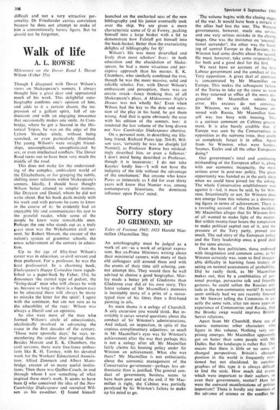Walk of life
A. L. ROWSE
Milestones on the Dover Road J. Dover Wilson (Faber 55s) Though I disagreed with Dover Wilson's views on Shakespeare's sonnets, I always thought him a great dear and appreciated much of his work. This delightful auto- biography confirms one's opinion of him, and adds to it a certain charm, the im- pression of a gallant spirit, full of en- thusiasm and with an engaging innocence that occasionally makes one smile. At Cam- bridge, where he got a Second in the His- torical Tripos, he was on the edge of the Lytton Strachey circle, without being scorched, or even particularly illumined. The young Wilson's were straight friend- ships, uncomplicated, unsophisticated by sex, or even intellectual conflicts. The Dover Road turns out to have been very much the middle of the road.
This does not make for the understand- ing of the complex, ambivalent world of the Elizabethans, or for grasping the subtle, shifting inner relations within Shakespeare's sonnets. Ideally, I should have thought Wilson better attuned to simpler natures, like Drayton and Daniel, whom he did not write about. But his book deals mainly with his work and with persons he came to know in the course of it: he evidently had an enjoyable life and communicates his zest to the grateful reader, while some of the people he knew were remarkable men. Perhaps the one who stands out as a truly smut man was the Wykehamist civil ser- vant, Sir Robert Morant, the creator of the nation's system of grammar schools, the nnest achievement of the century in educa- tion.
Up to the age of fifty-four Wilson's career was in education, as civil servant and then professor. For a professor, he was the least professorial. In a charming book, Shakespeare's Happy Comedies (now repub- lished as a paper-back by Faber, 15s), he denounces 'the eternal type of pedant, the "living-dead" man who will always be with us, because so long as there is a human race to be educated there will always be many to mistake the letter for the spirit'. I agree with the sentiment, but am not sure as to the educability of the race: Wilson was always a liberal and an optimist.
So also were most of the men who formed Wilson's circle of educationists, idealistically involved in advancing the cause in the first decades of the century. 'Those were apostolic days,' he says, re- membering the ardour that inspired them. Besides Morant and E. K. Chambers, the civil servants, there were free-lance enthus- iasts like R. H. Tawney, with his devoted work for the Workers' Educational Associa- tion; Alfred Zimmern and Albert Mans- bridge, creator of so many useful institu- tions. Then there was Quiller-Couch, in and through whom I saw something of what inspired these men's work. It seems to have been Q who conceived the idea of the New Cambridge Shakespeare and recruited Wil- son as his co-editor. Q found himself launched on the uncharted seas of the new bibliography and his junior eventually took over the ship. We are given a more characteristic scene of Q at Fowey, packing himself into a large basket with a lid to demonstrate how Falstaff got himself into the buck-basket. Better than the excruciating delights of bibliography for Q!
Wilson's life was more diversified and lively than most scholars' lives: in both education and the elucidation of Shake- speare, he had a more vivacious and per- ceptive approach than his master, E. K. Chambers, who similarly combined the two, though he was the more massive, solid and reliable scholar. For, with Dover Wilson's enthusiasm and perception, there was an erratic streak—fancy thinking that, of all Shakespeare's plays, A Midsummer Night's Dream was not wholly his! Even when Wilson had the key to the date and occa- sion of the play in his hand, he got them wrong. And that is quite obviously the case with his edition of the sonnets, too: it rendered the last volume of the long drawn out New Cambridge Shakespeare abortive.
On a personal note, in describing my life- long friend, Richard Pares (pp. 264-8), Wil- son says, 'certainly he was no disciple [of Namier], as Professor Rowse has mislead- ingly described him, or even a follower.' 1 don't mind being described as Professor, though it is inaccurate: I do not take Keynes' lordly line—'I will not have the indignity of the title without the advantage of the emolument.' But anyone who knew Pares as intimately as I did for over thirty years will know that Namier was, among contemporary historians, the dominant influence upon Pares' mind.


































 Previous page
Previous page